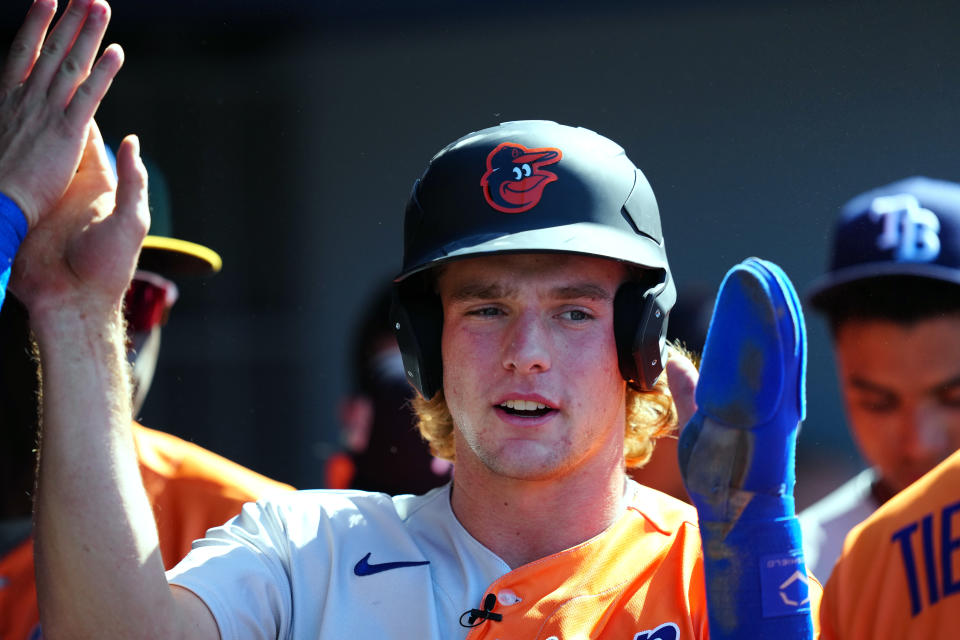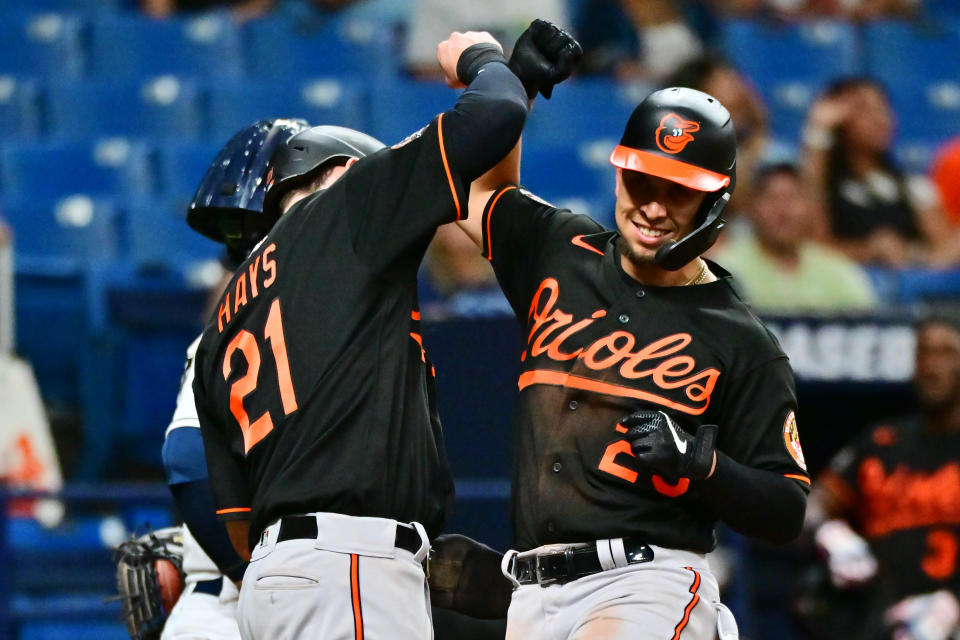MLB’s All-Star week is a celebration, an exhibition, an honor and a party. It is also, as the unofficial midway point, an opportunity to take stock of the season that it bisects. Storylines of 2022 include the unstoppable New York Yankees led by a giant chasing legends, their crosstown would-be rivals making a new reputation for themselves under new ownership, and Shohei Ohtani putting up a sequel to his historic season that is somehow equally unparalleled.
Those are the headlines, anyway. But look a little closer — especially around the festivities in Los Angeles this week — and you’ll see a surprising story taking shape just below the surface: The big, bad Baltimore Orioles are coming and the rest of baseball better watch out.
The Orioles entered the season as the fifth team in an American League East that had people wondering whether a single division could send four teams to October under the expanded postseason. And when all is said and done, and the final standings are set in stone, the Orioles are likely to still look like an also-ran in baseball’s most grueling gauntlet. But six years after they last finished with a winning record, the team is poised to become a powerhouse. Just like they drew it up.
If the plan was to sneak up on the rest of the sport, that got a little harder after they won 11 of their last 13 games entering the break, including 10 in a row. They’re now 46-46, a better record than 12 of the other 29 teams. Ninety-two games into the season, they have just one fewer win than they did all year in 2018 — the first of three consecutive 162-game seasons that they finished with more than 100 losses (every year since, except the pandemic-shortened 2020).
They’re better, in other words, than they have been in a long time. And this is just the beginning. After that dismal 2018 campaign, the Orioles brought in Mike Elias, one of the architects of the Houston Astros’ carefully constructed turnaround from laughingstock to champions as their new general manager. And he brought with him NASA engineer-turned-baseball analytics innovator Sig Mejdal. Say what you will about the 2017 team that took home a now-tainted trophy, but Houston’s ongoing dominance in the AL West is built on more than just sign-stealing. That kind of sustained success is every baseball team’s ultimate goal. And the Orioles have reason to believe they’re right on the precipice.


Building baseball’s best farm system
In the first at bat of the first event of All-Star week, 21-year-old shortstop Gunnar Henderson walked. A wild pitch later, he was on third base. After a single from his teammate, Henderson scored the first run of the Futures Game, a best-of-the-best showcase for minor league talent. It’s an industry-favorite event that barely registers with casual fans, but serves as an effective forecaster of the next great big leaguers.
Henderson earned starting honors by slashing .294/.428/.540 across Double-A and Triple-A this year, punctuated by hitting for the cycle shortly before the break. According to MLB Pipeline, he’s one of two prospects the Orioles have in the midseason top five, along with the top pitching prospect and his teammate at Triple-A Norfolk Grayson Rodriguez. They’re a big part of why Baltimore’s farm system is considered the best in baseball by a number of different ranking systems.
The Norfolk team of could-be contributors and top prospects keeps close tabs on the big league club. During the Orioles’ recent winning streak, the games were always on in the Triple-A locker room.
“We were like, alright this is No. 8, this is No. 9,” Henderson said pregame on Saturday. “It was pretty special to watch. Hate that they lost it, but it was fun when it was going on.”
And after the games, he’ll check in with his friends and fellow products of the Orioles’ player development system, sending Snapchats (I thought it was just pictures, but apparently that’s how kids these days communicate) to someone who’s about a half-season ahead of him in Baltimore’s plan for baseball domination. When Adley Rutschman debuted in late May, it marked what many Baltimore fans considered an inflection point. The lows of 2018 had netted them the first overall draft pick in 2019, and with that they’d selected the switch-hitting college catcher. Until he graduated from prospect status just before the All-Star break, Rutschman had sat atop most prospect lists — the clearest sign of sunnier times to come, and an unwitting testament to the utility of tanking.


Following the Astros’ blueprint
As part of MLB’s (mostly ineffective) efforts to make the draft a marquee event, the first round is now held in public plaza on the day between the Futures Game and the Home Run Derby. As commissioner Rob Manfred milled about, waiting to announce the first overall pick, the folksy fight song “Orioles Magic” played.
“Nothing could be more exciting. Nothing could be more fun,” the jingle insists. “Orioles magic, feel it happen.”
For the second time in the past four drafts, the Orioles had the first overall pick in 2022. And with a draft lottery — specifically implemented to curtail the kind of rebuild Baltimore has embarked upon — poised to take effect next year, theirs was the last-ever guaranteed top pick. They tanked just in time to justify doing so.
In what Elias characterized as a last-minute decision, the Orioles selected Jackson Holliday, a high school shortstop who hit .685 with 17 home runs in his senior season and is the son of seven-time All-Star Matt Holliday. It’s too soon to tell how that’ll play whenever he eventually makes it to Camden Yards, but it represented a chance for the Baltimore brass to cash in on their 110-loss season and reaffirm a commitment to the process.
“Definitely not something that was factored into the selection of the first overall pick,” Elias said about the recent run of success at the major league level on a Zoom with reporters during the draft. “This was the prospect that we wanted to add to the pipeline.”
Staying the course in spite of blips and blowback is key to a successful rebuild, but Elias alluded in his explanation to why at least some fans have faith in him.
“When you’re a shortstop, it’s hard to find yourself blocked,” he said, referencing the defensive skill required to play that position that translates around the infield. “When I was in Houston, we took Alex Bregman the year [Carlos] Correa debuted, and we never worried about it. Sure enough, we found a way to get both those great players into the lineup.”
That was 2015, Houston took Bregman second overall. He debuted the very next season and from then until Correa left this past offseason, the Astros made the postseason five times and won the pennant in three of those years. The Orioles are eyeing a similar run in the not-so-distant future, banking explicitly on being able to replicate what worked in Houston.
“Obviously, the blueprint Mike [Elias] and Sig [Mejdal] brought over from Houston is a big part of that,” said Orioles director of draft operations Brad Ciolek, who has been with the club full time since 2013 and previously as an intern. “The information that is accessible to us now we just never really had before.”
Whether that blueprint — in which a team bottoms out to more efficiently restock their farm system — is bad for baseball is a more complicated question than whether the fans in Baltimore have reason to hope the days of 100 losses are behind them.
“I do think it’s a pretty significant mile marker for us, honestly, to be making this pick — and the next three picks that we’re going to have — on a night when our group finishes with a .500 record,” Elias said minutes after selecting Holliday. “We’re adding a big new wave to the bottom of what is an excellent farm system. I say it all the time, our division is ridiculous. We’ve gotta tangle with these four extraordinarily well-run, well-resourced organizations. But I think this Orioles organization is in the healthiest spot it’s been in in a very long time, and it got a lot healthier 20 minutes ago.”
And wherever the team ends up at the end of this season, that’s bad news for the rest of baseball.
